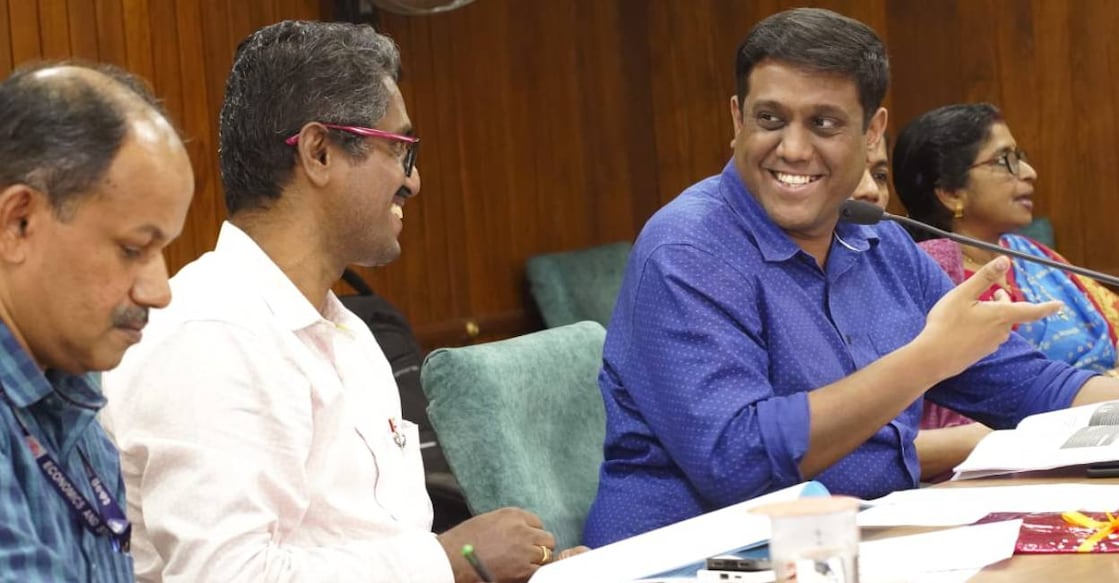Govt employees overall happy; workload, bossy behaviour among reasons for unhappiness: Survey

Mail This Article
Kochi: How happy were you with your last visit to a government office? An anybody’s guess? Reserve the answer for yourself. The officers who are supposed to deal with your problems, however, seem to be not much worried. A survey, a first of its kind, conducted among a section of government employees in Ernakulam has found that they are happy, mostly.
The happiness survey was conducted among the employees of all 37 at Ernakulam Civil Station at Kakkanad, examining various factors such as communication, job security, working conditions, and physical health, among others. The overall happiness score for employees stood at 3.55 on a 5-point scale, “indicating a generally positive sentiment with room for improvement in certain areas.”
The survey report was released by District Collector NSK Umesh at a function attended by B Sreekumar, director, Economics and Statistics, at the collectorate conference hall on Friday.
The department-wise analysis revealed that the Department of Factories & Boilers scored the highest in employee happiness with a score of 4.5, while the District Social Justice Office scored the lowest at 2. When it comes to happiness by employment category, gazetted officers and heads of the office reported the highest levels of happiness, with 66.67% and 65.22% of employees in these categories feeling happy or very happy, respectively.
Non-gazetted (other staff) and non-gazetted supervisory officers reported lower happiness levels, with 51.28% and 49.98% of employees feeling happy or very happy.
According to the survey, the score of 3.55 suggests that “on average, employees lean towards agreeing with statements related to their happiness. It shows that employees generally feel happy, though not overwhelmingly so. There might be some areas where they feel neutral or slightly less happy, but overall, the sentiment is positive.”

A total of 13% of the employees describe themselves as very happy, 41% say they are happy and 38% say their happiness level is satisfactory. This indicates a stable work environment reported by 92% of employees of various departments in Civil Station, Ernakulam. Seven per cent of employees say they are feeling happy only occasionally, whereas 1% describe themselves as unhappy.
Gender-wise analysis of happiness shows that 12.66% of female employees are very happy, 44.30 % of them are happy and 5.06% of them say they are occasionally happy. 36.71% of female staff feel a satisfactory level of happiness and only 1.27 female employees describe themselves as unhappy. A total of 14.77% of male staff of Ernakulam civil station are very happy in their office premises, 35.23% male staff are happy and 9.09% revealed that they are feeling happy only occasionally. 39.77 % male staff have a satisfactory level of happiness but 1.14% male staff are unhappy in their work environment.
The survey was conducted among 20 per cent of the staff of each department. Of the 20 % sample drawn from an office, 30% gazetted Officers and 70% non-gazetted officers were randomly selected. The criteria were 1. communication at work (quality of understanding and interaction with colleagues and communication and relationship with immediate supervisor), 2. job benefits (job security, salary and allowances, societal recognition, promotion opportunities), 3. working conditions (hygiene, technical facilities, work safety), 4. training and guidance, 5. autonomy in work (freedom to suggest ideas, order tasks, and choose methods) 6. engagement with work (level of interest and enjoyment in job tasks), 7. physical health strain (physical strain due to work), and 8. stress (emotional or mental stress due to work).
Regarding work freedom, gazetted officers and heads of office generally reported high levels of work freedom, though some felt restricted. Non-gazetted (other staff) had diverse experiences, with many rating their work freedom as average. The primary reasons for happiness among employees included cooperation among colleagues (69.96%), job security (62.55%), and recognition in society (53.09%).
The major reasons for unhappiness included workload (26.34%), strict supervisory behaviour (19.34%), and lack of work freedom (17.28%). The study also identified key stressors such as lack of training (16.05%) and personal problems (14.81%). Correlation analysis showed that job satisfaction strongly correlates with mental health (0.50) and promotion opportunities (0.45), while physical health and mental health are closely linked (0.73).
The study concludes with suggestions for improvement based on employee feedback. Recommendations include better communication, enhanced job security, improved working conditions, and greater recognition for their work.
The survey findings emphasize the importance of leadership in fostering a positive work environment, with 95% of employees believing that managers hold the primary responsibility for ensuring employee happiness.
Personal life is important: Collector
Releasing the report, Collector Umesh said that it is important to find happiness in personal life to remain happy at workplaces. "It is an occasion to self-introspect whether you are happy at your workplace or not. You should tell your superior if you are not happy. Even if the issue cannot be solved, you can unburden your mind by opening up," the IAS officer pointed out.
In a lighter vein, the collector added that he was sad that he was not surveyed.
Economics and Statistics deputy director Shojan A P, district officer-in-charge Jamal K M, ADM Asha C Abraham and senior town planner Indu Vijayanath also spoke. Research officers Indu K A and Reshmi A R, and statistical assistant B J Pradeep presented the report.

